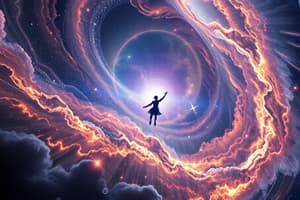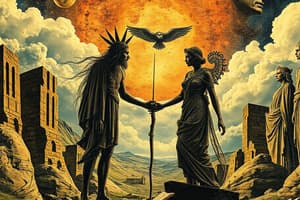Podcast
Questions and Answers
What do creation myths aim to explain?
What do creation myths aim to explain?
- The scientific laws governing the universe.
- The classification of different species on Earth.
- The historical events of human civilizations.
- The origin, evolution, and fate of the universe. (correct)
Which common theme can be found in many creation myths?
Which common theme can be found in many creation myths?
- The establishment of global trade routes.
- The idea of humans evolving from apes.
- The use of deity or deities to create the world. (correct)
- The discovery of extraterrestrial life forms.
In the Abrahamic faiths, how is God often perceived in relation to the universe?
In the Abrahamic faiths, how is God often perceived in relation to the universe?
- As a deity who merely observes but does not interfere.
- As a minor entity subject to other higher powers.
- As the sole creator and sustainer of the universe. (correct)
- As a mythological character with no actual influence.
What role does God play in the creation story of the Bible's Old Testament?
What role does God play in the creation story of the Bible's Old Testament?
What distinguishes creation myths from scientific theories about the universe?
What distinguishes creation myths from scientific theories about the universe?
Which aspect is typically NOT part of creation myths?
Which aspect is typically NOT part of creation myths?
Which religious tradition focuses more on the cyclical nature of existence rather than a single creation event?
Which religious tradition focuses more on the cyclical nature of existence rather than a single creation event?
What is a common feature in Chinese religions like Confucianism, Taoism, and Chinese Buddhism regarding the creation of the universe?
What is a common feature in Chinese religions like Confucianism, Taoism, and Chinese Buddhism regarding the creation of the universe?
Which religious perspective suggests that the universe emerged from a pre-existing substance or entities?
Which religious perspective suggests that the universe emerged from a pre-existing substance or entities?
In which religious belief system is the creation of the universe often described as emerging from the cosmic ocean, an aspect of the deity Brahma?
In which religious belief system is the creation of the universe often described as emerging from the cosmic ocean, an aspect of the deity Brahma?
What has led to increased interaction between theistic and scientific views of the universe?
What has led to increased interaction between theistic and scientific views of the universe?
What role do religious beliefs about the origin of the universe play in different societies?
What role do religious beliefs about the origin of the universe play in different societies?
Flashcards are hidden until you start studying
Study Notes
Religious Cosmology: Creation Myths and the Origin of the Universe
Throughout history, various religious and cultural traditions have proposed different cosmological theories to explain the origin, evolution, and eventual fate of the universe. These theories often involve the role of a deity or deities in the creation of the world and the laws governing it. In this article, we will explore religious cosmology, focusing on creation myths and the concept of the origin of the universe in different religious beliefs.
Creation Myths
Creation myths are stories that explain how the universe, the earth, and humanity came into existence. These myths can vary greatly between different cultures and religions, reflecting the unique perspectives and beliefs of each society. Some common themes in creation myths include the use of a deity or deities to create the world, the separation of different elements of the universe, and the creation of humanity.
Abrahamic Faiths: Judaism, Christianity, and Islam
In the Abrahamic faiths, God is often perceived as the sole creator and sustainer of the universe. The origins of the universe are typically explained through the concept of creation, with the deity bringing everything into existence through a divine act. For example, in the creation story of the Bible's Old Testament, God is described as creating the world in six days.
Hinduism and Buddhism
In Hinduism and Buddhism, the concept of creation is often less focused on a single event and more on the cyclical nature of existence. The universe is seen as going through a series of transformations, with one cycle leading to another.
Chinese Religions
Chinese religions, such as Confucianism, Taoism, and Chinese Buddhism, often involve a variety of deities and spiritual beings that play a role in the creation and maintenance of the universe.
The Origin of the Universe
The concept of the origin of the universe is often closely tied to the creation myths of different religions. Some traditional beliefs propose a creation from nothing, while others suggest that the universe emerged from a pre-existing substance or entities.
Theistic Views
Theistic views, such as those found in Christianity, Islam, and Judaism, typically propose that the universe was created by a deity. This creation often occurs through a specific event, such as the six days described in the biblical account of creation.
Non-theistic Views
Non-theistic views, often found in Eastern religions like Hinduism and Buddhism, may suggest that the universe emerged from a pre-existing substance or entities. For example, in Hinduism, the universe is often described as emerging from the cosmic ocean, which itself is an aspect of the deity Brahma.
Theism and Scientific Cosmology
The development of scientific cosmology has led to increased interaction between theistic and scientific views of the universe. While scientific cosmology has provided new insights into the physical aspects of the universe, it has not necessarily replaced traditional theological views. Some theologians and philosophers have sought to reconcile the two perspectives, while others have argued for a more rigid separation between the science of the cosmos and theistic beliefs about its origin and meaning.
Conclusion
Religious cosmology encompasses a wide range of beliefs and perspectives on the origin, evolution, and eventual fate of the universe. These beliefs often play a central role in the spiritual and cultural traditions of different societies, providing a framework for understanding the world and our place within it. While scientific cosmology has provided new insights into the physical properties of the universe, it has not necessarily displaced traditional religious views on its origin and meaning. Instead, these two perspectives often continue to coexist, offering complementary ways of understanding the cosmos and our place within it.
Studying That Suits You
Use AI to generate personalized quizzes and flashcards to suit your learning preferences.




